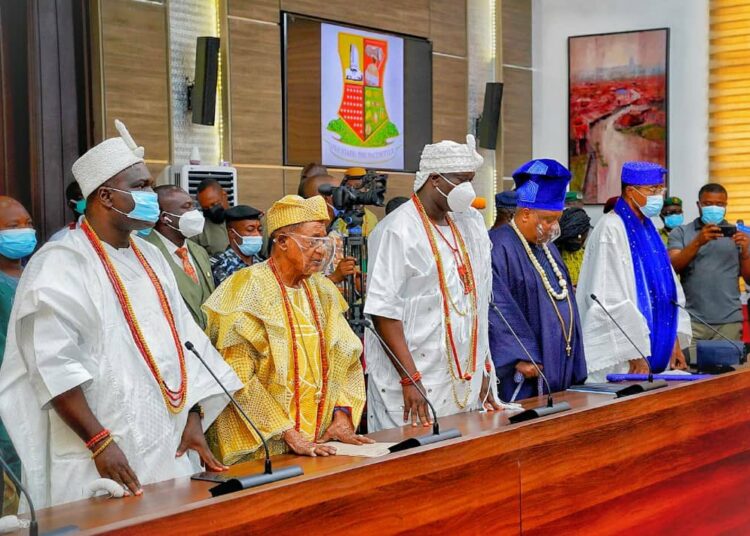Traditional rulers are assumed to be custodians of the fine ideals of a people’s culture and tradition. To the people, they embody the ethos and values of their society. They are expected to dedicate themselves to maintaining peace, order, security, and the general well-being of their subjects. That is why, apart from instances where hereditary kingship is the practice, communities have historically taken great care in choosing their local leaders. They usually enthrone those with the best character they could entrust with catering to their varied needs.
Over the years, various societies have witnessed the coronation of individuals with questionable character, whose conduct in office has left many bewildered. There are now worrying incidents of traditional leaders becoming involved in unwholesome activities unbecoming of their exalted office.
Two recent incidents involving traditional rulers in parts of Nigeria have elicited public shock and condemnation. One is the viral video footage of the public humiliation and assault of a 73-year-old man, Chief Areola Abraham, on the orders and supervision of his king, Oba Abdulsemiu Ogunjobi, the traditional ruler of Orile Ifo in Ogun State.
Oba Ogunjobi, a retired sergeant in the Nigeria Police Force, and his cohorts forced the elderly man to kneel, beg, and constantly prostrate before the monarch, whose aides slapped and rained curses on the thoroughly terrorised elderly man, in addition to some infantile boasts, including claims that he owned the police force. What was so disconcerting was this show of shame; this grave indecorum took place on the street, in the glare of members of the public.
Already, the monarch’s retribution is coming thick and fast. First, the state government suspended him from his royal position for six months. Then, he was arrested and is being prosecuted, along with his collaborators, on charges of assault and acts capable of breaching public peace, among others. He and his gang of tormentors may well end up in prison.
The second recent incident involving a traditional leader occurred on February 2, 2025, at Angwan-Bala in Karim Lamido local government of Taraba State. Sixth Brigade of the Nigerian Army stationed in the area alleged that the district head of Amar had collected N1.5 million from bandits from Plateau State to set up their camp in his domain.
Pending the outcome of ongoing legal processes, these two acts qualify as a betrayal of trust and completely negate the attitude and character expected of persons occupying such exalted seats as traditional rulers of their communities.
Before this development, many traditional leaders had been caught in criminal and other unwholesome activities, leading to their suspension or outright dethronement, which suggests that this trend has not just begun.
In 2019, Oba Akiolu of Lagos was reported to have threatened to drown residents in the lagoon if they did not support his political choices in that year’s general election. This highly embarrassing statement could potentially disrupt Nigeria’s commercial capital’s peace and social order. It was even more unacceptable because monarchs are traditionally expected to be apolitical so they can accommodate their subjects’ varied political persuasions.
In August 2020, the traditional ruler of Uba community in Awara, Ohaji/Egbema local government area of Imo State, Eze Andrew Okuegbunuwa, was arrested for allegedly organising kidnapping and armed robbery activities within and outside his community. The traditional ruler was said to have provided the kidnappers with an operational vehicle and received payment from them.
In October 2024, the Village Head of Unguwan Tambai, Runka in Safana local government area of Katsina, Usamatu Adamu, was arrested for allegedly supplying information to bandits. The police said he was linked to several kidnapping incidents in Runka in Safana local government area of the state.
In July 2024, the police in Zamfara State arrested the district head of Kaura Namoda in Kaura Namoda LGA over his alleged involvement in kidnapping and banditry while also placing three other district heads under investigation for the crimes—the district heads of Danjibga, Bukkuyum, and Unguwar Gyauro in Tsafe and Bukkuyum LGAs.
As a newspaper, we are concerned that the actions of a few undesirable elements are undermining the otherwise revered traditional institutions. This trend, in our opinion, is a serious disincentive to calls for monarchs to be given constitutional roles to entrench peace and good governance at the community level.
Additionally, proper checks need to be conducted on the backgrounds and antecedents of those to be crowned or appointed as monarchs and community heads to ensure that the custodians of the people’s ethos and values deserve such positions.
Most of the monarchies in Europe were abolished when they were perceived to have veered off their roles as custodians of culture and tradition.





